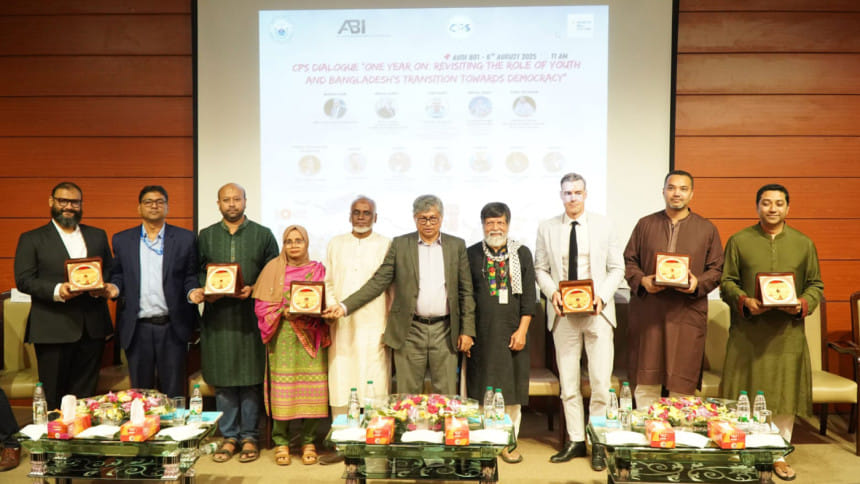NSU, ABI host dialogue marking July Uprising anniversary

North South University (NSU) and Germany's Arnold Bergstrasser Institute (ABI) have jointly hosted a dialogue and three-day photo exhibition marking one year since the events of July 2024.
Organised by the university's Center for Peace Studies (CPS), the event focused on the role of youth in Bangladesh's democratic transition. The photo exhibition was inaugurated by A. K. Kashem, Board of Trustees member and founder life member of the NSU Trust.
Titled "One Year On: Revisiting the Role of Youth and Bangladesh's Transition Towards Democracy," the CPS Dialogue brought together academics, legal experts, and civil society figures to reflect on democratic values, constitutional reform, and the importance of preserving collective memory.
Opening the discussion, CPS Director Dr. M. Jashim Uddin said, "This dialogue is not a mere formality - it carries the legacy of a history. Democracy is not a political structure; it is the spirit of the soul. We must build the foundation of our democracy through these two paths: memory and education."
Chief guest Professor Dr. Asif Nazrul described the 2024 movement as the beginning of a new chapter, saying, "People protested even at the risk of death, because our young generation has overcome the fear of the ruler. The revolution is not over—it is an ongoing process. This revolution must be sustained and carried forward." He also criticised global inconsistencies in human rights advocacy, stating, "The very countries that advocate for human rights are the ones involved in arms trade, which violates the human rights of other nations. To counter this double standard, we must foster a culture of introspection and education."
Political analyst Bobby Hajjaj recalled the sacrifices made by students. "This movement was not just political; it was a journey of self-realization. Everyone should celebrate and preserve this moment," he said, while also thanking advisory board members for their efforts in announcing the election date.
Advocate Shishir Manir warned of weak coordination among the judiciary, executive, and legislature, saying, "If these three branches do not function properly, a democratic state structure will collapse. Our goal is for the upcoming elections and governance to be conducted on the basis of the constitution."
Barrister Mir Ahmad Bin Quasem, who returned after being forcibly abducted for eight years, said, "I feel like a man buried in a grave. The fact that we are speaking today is due to the sacrifice of thousands of young people. We must not forget—we must learn to see people as human beings, not by their party affiliations."
Barrister Asaduzzaman Fuaad described the political landscape as fragmented. "Bangladesh today seems like a movie stage—one group is shouting, one is silent, and a third group is embracing death with a smile. This third party is the true symbol of freedom. The creators are now in a state of flux—the question today is whether this movement will succeed or fail," he said.
Dr. Mahdi Amin said the movement was notable for its unity across political and social divisions. "In this movement, there was no influence of right-left, Islamic-secular, or class divisions. Everyone stood under one flag, solely for Bangladesh. Now is the time for constitutional and administrative reforms that will help change the fate of the common people," he said.
Bilkis Zaman, mother of the martyred Tanvin, addressed the gathering as guest of honor. "My son went to the movement and returned as a corpse. I don't want any more mothers to lose their children. May his death not be in vain, and may justice be served for the injustice," she said, moving the audience with her grief.
Photographer and activist Shahidul Alam said that marginalised communities played a central role in both the 1971 and 2024 movements. "Most of the martyrs were working-class people. To bring about change, their voices must be brought to the center," he said.
Dr. Bernd Spanier, Chargé d'Affaires of the European Union to Bangladesh, reflected on the global significance of grassroots activism. "Observing what happened in July last year, I realized that a small demand can trigger a major change. However, the success of that change depends on a fundamental transformation of political culture," he said.
The session was chaired by NSU Vice-Chancellor Professor Dr. Abdul Hannan Chowdhury, who said, "No nation can develop without education. If one generation is willing to sacrifice, the next can enjoy the fruits of that achievement. We must all believe in the dignity of human beings so that the nation never has to bow its head."
The event marked a moment of reflection on the sacrifices and aspirations tied to Bangladesh's ongoing democratic journey, with speakers agreeing on the importance of youth participation, memory, and institutional reform in shaping the country's future.

 For all latest news, follow The Daily Star's Google News channel.
For all latest news, follow The Daily Star's Google News channel. 



Comments